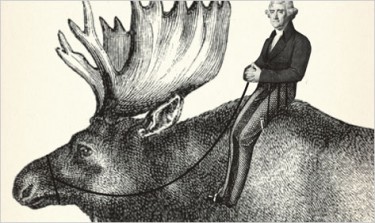Here's Another Part Of Your Body Having A Child Will Mess Up

Ladies, you know that baby you so desperately want, the one that you are racing against time and your decaying ovaries to have, because, really, what is the point of being a woman if not to make a child? Sure, we can talk about “fulfillment” and “career” and “potential” as much as you want, but we all know that at the end of the day society is going to judge you on whether or not you’ve squeezed out a tiny version of yourself. And it’s not just society, it’s YOU. If you don’t procreate you are going to spend the rest of your life hating yourself, wallowing in misery and recrimination over your childless existence. This is why you never see a picture of Susan B. Anthony smiling. Anyway, where was I? Oh, right, that baby you want? You can go ahead and have it, but it’s gonna cost you a tooth.
Photo by Subbotina Anna, via Shutterstock
Bear Pics Bad News All Around
“A southern California man killed by a grizzly bear in Alaska’s backcountry was shooting photos of the animal that killed him just moments before the attack, a National Park Service official said Sunday…. State troopers, park rangers and wildlife biologists, using the photos to identify the ‘large male bear,’ shot and killed the animal as it was still ‘defending the kill site along the Toklat River as the recovery team attempted to reach White’s remains,’ the park service said.”
The Elevator To The Moon
“A space elevator capable of taking robots and humans back to the surface of the moon can be built today, a California firm has claimed. The radical Liftport system would allow cheap and simple access to the lunar surface via a ‘ribbon’ cable. Eventually it is hoped a ‘space elevator’ could even take people from earth directly to the lunar surface.”
— Naturally, they are on Kickstarter. Whatever, it is too early in the week to get worked up about this.
Mitt Romney, Comedian: Actual Examples
“He must use humor, for three reasons. One is that wit breaks through and sharpens all points. Another is that it is natural to him. Before the voting in Iowa, he wryly told a friend that the caucuses were like the LaBrea Tar Pits: ‘No one comes out the way they went in.’ On a conference call recently, he asked a question of his staff. No one answered. Mr. Romney waited. ‘Bueller? Bueller?” he said, in a perfect imitation of Ben Stein.’”
— He’s also good with birther jokes! Anyway, Peggy Noonan picks up another cheerleading check.
Pee-wee Herman Is 60
Pee-wee Herman Is 60
Goodbye, Neil Armstrong — courageous pioneer and hero.
— Pee-wee Herman (@peeweeherman) August 26, 2012
Performer Paul Reubens turns 60 today. 60! Remember that time he got caught doing that thing to his thing? Even that was more than 20 years ago. Let it go already! Anyway, many happy.
The Unpublished Manuscripts Of Aaron Sorkin
The Unpublished Manuscripts Of Aaron Sorkin

Imagine that an intern on HBO’s hit show “The Newsroom” discovers a cache of unpublished pages while sifting through Aaron Sorkin’s desk drawers in search of a cease-and-desist form letter. Who knew that the man behind “The West Wing” and “The Social Network” had such wells of passion for classic Russian novels — and prescription drug literature?
Big Mouse and Small Mouse!
A Children’s Story by Aaron Sorkin
There was a little house on a little hill that belonged to Little Mouse. One day Big Mouse rode right up that hill on a big bulldozer and knocked down Little Mouse’s house.
“Why are you knocking down my house?” asked Little Mouse.
“Your house?” said Big Mouse.
“My house,” said Little Mouse. “Why are you knocking it down?”
“So this is your house?” said Big Mouse.
“You’re driving a bulldozer and half of my house is knocked down,” said Little Mouse.
“Half knocked down or half built? It’s all about perception,” replied Big Mouse.
“I’m calling the cops,” said Little Mouse.
“Do people really do that?” asked Big Mouse.
“Do what?” asked Little Mouse.
“Call the cops. I thought they only did that on TV,” said Big Mouse.
Little Mouse ignored this and went into his house and looked around for his Blackberry. He looked and looked and looked, but half of his house was knocked down! He couldn’t find it!
“Do the cops even come to this neighborhood? I mean, when you call?” asked Big Mouse, following Little Mouse around his half-collapsed (or half-built) house.
“I wouldn’t — I mean, I haven’t — “ said Little Mouse.
“Seems more effective just to keep a gun in your sock drawer,” said Big Mouse.
“I don’t believe in — “ replied Little Mouse.
“You don’t believe that guns exist?” said Big Mouse.
“Don’t do that,” said Little Mouse. “Don’t purposefully — “
“Which is it?” asked Big Mouse.
“I don’t believe that it’s right to pack heat, or to drive a giant bulldozer around, knocking people’s houses down, for that matter,” said Little Mouse, his voice growing louder. “Big Mice like you blame Little Mice like me for everything from high taxes to the moral degradation of our country to the sorry state of the economy, turning a blind eye to reckless Wall Street bigwigs who can’t tell a credit default swap from a wart on their… How dare you?! You’re the ones tearing everything down! How dare you?!”
At this, Big Mouse felt ashamed of himself, so ashamed that he pulled a semi-automatic from his bulldozer and pointed it at Little Mouse’s head.
“Guns do exist, homes,” said Big Mouse.
“I’m willing to retract at least part of what I just said,” said Little Mouse.
Before Big Mouse could shoot his gun, which would probably be racist now that he’s addressed someone as “homes,” sirens were heard. Cops on the way, even in this neighborhood. (This is a fantasy, in other words.) Big Mouse ran, looking slightly deranged. Little Mouse cried a big, salty tear, and said, “America has changed. It has really, really changed.”
Then he got into his little bed, to rest his weary head. “And not for the better, either,” he said.
The End.
Crime and Punishment
Reimagined by Aaron Sorkin
Raskolnikov stirred his martini and sighed heavily, pinching the bridge of his nose between his strong fingers. He was so frazzled by the old woman — or maybe she was his age, she should wear her hair down and meditate more. His handsome face looked weary and moist, but refined. Why must St. Petersburg smell so bad? The room was packed with preening radicals, casting suspicious glances at each other. They’re sick inside, he thought. Hypocrites. No better than the Tsar. They were probably thinking the same thing about him. Or thinking that he was thinking that they were thinking the same thing about him. Neurotic idiots!
At last he turned to Sonia, looking straight into her beautiful face, although her nose was a little too pointy. That had always bothered him. And she went to Vanderbilt. Is that really a good school? She didn’t speak, but color rushed to her face. Her unabashed passion for him disgusted him, but then he thought of the really good medicinal pot she kept in her bedside table at home, next to her Bible. The madness of it, not having his own stash! Plus, all the suffering of humanity! His hands shook, his eyes glittered. All at once he grabbed her purse, fumbling for a cigarette. Damn big tobacco. Just one!
Zoloft Side Effects
Written by Aaron Sorkin
All medicines may cause side effects, but many people have minor side effects or they pretend they don’t have side effects because they don’t want their favorite prescription dope to be taken off the market (and by “the market” I mean the legalized corporate drug market, which is every bit as corrupt as illegal drug trafficking, in case you were wondering; Pfizer and GlaxoSmithKline may as well be run by a Colombian guerilla group, for all of the unethical tactics they engage in). Anyway. Check with your doctor if any of these side effects persist or become bothersome when using Zoloft (although I wouldn’t necessarily trust anyone who was indoctrinated — see, the word says it all — by the stodgy precepts of traditional, institutional medicine, which is essentially an old boy’s club bankrolled by big pharma and therefore openly hostile to a more flexible, whole-body approach to wellness). So: Tightness In Chest (Beyond the usual level), Bizarre Behavior (When not drinking to excess or under tons of stress), Swirling-Room-Feeling (Like when Cheney said that stuff about bombing Iran), Trouble Sleeping (That just means you have a conscience), Confusion (Not while watching Fox News), Severe Ringing In Ears (And your cell phone is off, for sure this time), Unusual or Severe Mental or Mood Changes (Unless you just read something ill-conceived by that smug guy from that online magazine that only halfwits read), Worsening of Depression (Although, with the state of the world today, I’d be worried if you weren’t more depressed).
“Bossman”
Performed by Katy Perry
Lyrics by Aaron Sorkin
Sometimes I think I’m the girl you always wanted
Champion of facts, mortal enemy of speculation
Other times I think that I work for you
And I have to do whatever you want me to.
What did you say?
I don’t know, even though you repeated yourself.
What is this meeting about?
I can’t tell. You knocked me off my feet, so why do I feel like hell?
Oh baby, this sexual tension, it never goes without mention, no no.
Oh baby, your condescension, it triggers my apprehension. Sometimes I don’t know!
Take the high moral ground, and I’ll go even higher.
Let’s take on obese children and Holocaust deniers.
Oh baby, you know I can’t hide
I’ve got to live my life as if I am alive!
Apple Blossom Heating Instructions
Written by Aaron Sorkin
CONVENTIONAL OVEN: HEAT FROM FROZEN Preheat oven to 400ish, whatever you feel. Why should I care? Remove apple blossoms from wrapping, while averting your gaze sheepishly. They look so frozen. Are they supposed to look this frozen? Place on a baking sheet in the moral center of the oven. Yes, the moral center. Define that? It’s a hyperbole. Or a metaphor or an idiom or something. Did you really go to Harvard? Heat 15 to 20 minutes or until their soft, vulnerable interiors ooze all over the place and make a huge, embarrassing scene.
ALTERNATIVE/MICROWAVE OVEN: Give one of them an arrogant tic, like a nervous habit of looking at his watch. Make the cute one slightly stupid, or at least twitchy and hysterical. Place in a microwave safe fishbowl, like a crowded, hip bar or a big, open office or maybe the Oval office. Agitate their molecules for several minutes, until they shout, flail their arms around, pound their hands on the table, cite the Constitution, weep and tear their hair, rend their clothing, wail to the gods for mercy, and then go back to flashing each other furtive glances to the strains of Coldplay, just like none of that other stuff ever happened.
Oven temperatures may vary. Nothing is baked by committee. These are only guidelines, and I don’t feel qualified to… I have no idea what day it is. Go away.
A contributor to the New York Times Magazine, Heather Havrilesky was Salon.com’s TV critic for seven years and cocreated Suck.com’s Filler before that. She’s the author of the memoir Disaster Preparedness. She has dispensed misguided advice at the rabbit blog since 2001. Photo by s_bukley, via Shutterstock.com.
New York City, August 23, 2012

★ The heat kept going, by rote. Hotter than the day before. Haze glowed faintly over the streets. Skateheads lined up outside the Supreme store, armed with camp chairs for endurance, awaiting the chance to get something new. The lowering sun, which had shone straight into the living room in the weeks around the solstice and the Manhattanhenges, now dropped behind the megalith of the nearest apartment tower, its declination heading toward autumn. But its light hit the floors above us, bounced back to the windows of the obstructing building, and came in again on the second bounce.
The British Invasion... Again: The General And The Moose
The British Invasion… Again: The General And The Moose
by Robert Sullivan

Day three in a series exploring how the trail of the Battle of Brooklyn would pass across modern-day New York.
On August 24, 1776, there is not a lot going on fighting-wise in Brooklyn.
There are skirmishes amongst the woods and the farms where the British have landed, but Washington still has not figured out how huge the British landing is. He has sent General John Sullivan over to Brooklyn, a general who will be captured when the Battle of Brooklyn begins and will have a controversial record there after, despite several victorious battles after the crossing of the Delaware. Sullivan would wreak havoc on Native American settlements in western New York state, during the so-called Clinton-Sullivan Campaign of 1779 . But what I remember him most for are his dealings with the Comte de Buffon, aka George Louis Leclerc, France’s leading naturalist at the time of the war. Those dealings started, post war, in 1786, when Thomas Jefferson, America’s ambassador to France, wrote to Sullivan asking him to send him a moose. This was not a joke.
This moose request by Jefferson had to do with Buffon’s ideas regarding American flora and fauna. Buffon believed that North American animals were like European animals, though not as big or healthy. (This is analogous to the Republican Congress’ observations of Frenchmen versus Americans during the presidency of George W. Bush.) Buffon argued that the American landscape degenerated animals, and, from a PR standpoint, Jefferson felt that was not good for young America’s image. Jefferson, who, like just about everyone in Congress at that time, was himself a naturalist, and he worked to disprove Buffon’s theories, compiling lists of animal dimensions. “The Elk of Europe is not two-thirds of his height,” he wrote.
He sent Sullivan specific notes on how to mail the moose to France, and Sullivan sent skin and bones, as well as horns that were perhaps from another moose, which was good enough for Jefferson, who patched it all together and delivered it to Buffon, who was in charge of French natural history museum. Jefferson apologized for it being a relatively small American moose. Buffon promised Jefferson he would set thing straight in writing, but Buffon very soon thereafter died. As Gaye Wilson wrote in “Jefferson, Buffon, and the Mighty American Moose” (pdf): “Jefferson as diplomat, scientist, and citizen went to unusual lengths and personal expense to dispel unfavorable myths about his country by attempting to prove once and for all that the American moose was indeed unique and definitely bigger than its European counterparts.” Which is something I personally always try to give Jefferson credit for.
As far as the natural history of Brooklyn goes, Sullivan’s men were stationed in some woods near today’s Ditmas neighborhood. They were moose-less woods, but they were woods, highlighted by one tall oak tree well known as the Dongan Oak. This tree was named for Thomas Dongan, governor of New York in the 1680s, the Irish parliamentarian who called the first the first representative legislature in New York state. The tree denoted the eastern border of the town of Brooklyn. Sullivan’s men would cut it down to block the path from Flatbush, today known as Flatbush Avenue. Tall trees then, as today, mattered to people.
But the note of natural history that I have been working toward has to do with trees in the harbor. Yes, trees in the harbor. I am not talking about a sunken forest, or flotsam and jetsam. I am talking about trees floating. This may sound impossible but consider the diary of a colonist who looked out on the British fleet, rowing soldiers from their boats and encampments. I quote here from The Battle of Brooklyn, by the late John J. Gallagher, the go-to book on the battle, the book you ought to be carrying with you for the next week or so: “I spied as I peeped out the Bay something resembling a wood of pine trees trimmed. In about ten minutes the whole bay was full of shipping as ever it could be… I thought all of London was afloat.”
There are two things to consider here. First, the sight itself, which must have been awe-inspiring, not to mention terrifying. Second, the masts. The masts were made from tall trees. By this time in their history, the British landscape had lost most of its trees tall enough to be masts. British ship builders were known to take trees from Northern Europe and patch them together. Or they would use trees from New England. Throughout New England, colonists would come upon tall trees, in hopes of harvesting them, but they were often marked as reserved for the king. Now, in New York Harbor, a forest had sailed in. Meanwhile, as Washington reluctantly moved regiments over to the hill country of Brooklyn, New England soldiers were getting views of the British fleet, “a wood of pine trees trimmed.” What percentage of the masts were cut from New England? If a General John Sullivan of New Hampshire looked through his spy glass at a waterborne forest of former New Hampshire forest did that make him that much angrier?
Previously: The Landing In New York and Scouting Old Locations
Robert Sullivan is the author of a several books, including Rats, How Not To Get Rich, and the Meadowlands. His newest book My American Revolution will be published out Sept. 4 and is available for preorder. Top image is a detail from the cover of Mr. Jefferson and the Giant Moose.
Jerry Nelson, 1934-2012

“The cast and crew of Sesame Street and the staff of Sesame Workshop deeply mourn the loss of cast member and creator of dozens of Muppet characters, Jerry Nelson. A member of the Sesame Street family for more than 40 years, he will forever be in our hearts and remembered for the artistry in his puppetry, his music, and the laughter he brought to children worldwide through his portrayal of Count von Count, Herry Monster, Fat Blue, Sherlock Hemlock, the Amazing Mumford and many other beloved characters.”
